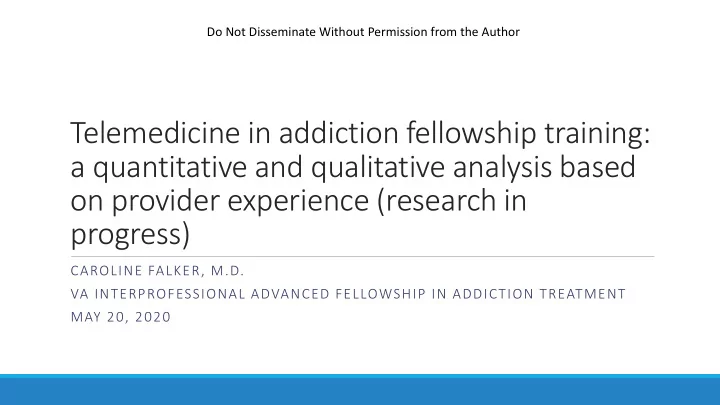

Do Not Disseminate Without Permission from the Author Telemedicine in addiction fellowship training: a quantitative and qualitative analysis based on provider experience (research in progress) CAROLINE FALKER, M.D. VA INTERPROFESSIONAL ADVANCED FELLOWSHIP IN ADDICTION TREATMENT MAY 20, 2020
Introduction Presenter: Caroline Falker, M.D. VA Interprofessional Advanced Fellowship in Addiction Treatment (year 1) VA Connecticut Healthcare System (West Haven, CT)
No disclosures
Outline 1. Background 2. Specific Aims 3. Research Design 4. Next Steps
Background: telemedicine in Addiction training • Telemedicine is an effective platform for substance use disorder (SUD) treatment delivery (especially if issues with treatment access) and is associated with high patient satisfaction and treatment retention (Lin et al. 2019) • Most Addiction fellowship training programs do not have formal telemedicine electives focused on SUD treatment (for example, of the 62 Addiction Medicine fellowship programs in 2018-2019, only 1 included an optional telemedicine clinical experience; The Addiction Medicine Foundation 2018-19) • Telemedicine in Addiction Medicine and Addiction Psychiatry training has been previously assessed using provider questionnaires, where participation in a telemedicine elective was shown to positively impact fellows’ perceived likelihood of practicing telemedicine in the future, as well as increased comfort providing care to remote populations (Broad et al. 2018) “Access to services, particularly behavioral health and substance use disorder (SUD) treatment services, is challenging in rural and other underserved areas…Telehealth can ease these challenges and support behavioral health, specifically SUD treatment, in a variety of ways, including direct patient care, patient engagement, and provider education. This is particularly relevant for the growing opioid epidemic, which has profoundly affected rural areas.” (U.S. Department of Health & Human Services, 2018)
Background: interprofessional opportunities in Addiction training • Addiction training is interprofessional/interdisciplinary at its core, and treatment of patients with substance use disorders requires collaboration between providers. There is substantial evidence that integration of primary and behavioral health services improves health outcomes for patients with substance use disorders (SAMHSA, 2013). • Provider co-visits in Addiction training, specifically with Addiction Medicine and Addiction Psychiatry fellows, have demonstrated the medical and psychiatric complexity of patients seeking SUD treatment and the opportunity for interprofessional care of such patients (Morford et al. 2019). Taken together: 1. Telemedicine should be a formal part of Addiction training 2. Telemedicine is a great platform to incorporate interprofessional training
Specific Aims 1. Formalize an interprofessional telemedicine rotation in Addiction training 2. Demonstrate that an interprofessional telemedicine rotation in Addiction training is feasible 3. Characterize the impact of interprofessional telemedicine co-visits on provider attitudes and self-assessment of knowledge and skills
Research design: clinical setting Patients • Veterans with opioid use disorder (OUD) +/- co-occurring substance use disorders, psychiatric and medical co- morbidities receiving OUD treatment through the “tele” buprenorphine clinic (based at the West Haven VA, serving patients throughout Connecticut) Providers • Addiction Psychiatry Fellows* • Addiction Medicine Fellows • Anesthesia Pain Medicine Fellows • Nurse Practitioner Residents Visit Format • Provider: West Haven or teleworking from home/other remote site • Patient: CBOCs or home
Research design: clinical setting Provider(s) Patient Visit Format
Research design: most likely initial clinical setting Provider(s) Patient Visit Format
Research design: most likely initial clinical setting Provider(s) Patient Visit Format
Research design: most likely initial clinical setting Provider(s) Patient Visit Format
Research design: most likely initial clinical setting Provider(s) Patient Visit Format
Research design Data collection • Quantitative assessment: ◦ Provider questionnaire ◦ questions focused on provider attitudes regarding interprofessional SUD treatment, telemedicine, self- assessment • Qualitive assessment: ◦ Open-ended/free text options within provider questionnaire regarding general experience with telemedicine and interprofessional care ◦ +/- semi-structured interview
Next steps 1. Finalize clinical setting 2. Finalize participating trainees (i.e. Addiction Psychiatry fellows + additional fellows or NP residents) 3. Pilot the provider questionnaire to current fellows to ensure readability and assess ease of administration 4. Implement interprofessional telemedicine elective for Academic year 2020-2021 (July 2020- July 2021) and administer provider questionnaire to all fellows/NP residents who complete the elective 5. Additional considerations: • Control group? • Other variables or provider assessment tools to consider?
Acknowledgements Dr. Gabriela Garcia Vassallo Dr. Ellen Edens Dr. Kenny Morford Dr. Ismene Petrakis
Thank you!
Questions or comments from the audience? caroline.falker@va.gov caroline.falker@yale.edu
References Lin, L. A., Casteel, D., Shigekawa, E., Weyrich, M. S., Roby, D. H., & McMenamin, S. B. (2019). Telemedicine- delivered treatment interventions for substance use disorders: A systematic review. Journal of substance abuse treatment , 101 , 38-49. Addiction Medicine Fellowship Programs 2018-2019. The Addiction Medicine Foundation. Buffalo, NY. U.S. Department of Health & Human Services, Office of the Assistant Secretary for Planning and Evaluation (2018). Using Telehealth to Identify and Manage Mental Health and Substance Use Disorder Conditions in Rural Areas. U.S. Department of Health & Human Services, Substance Abuse and Mental Health Services Administration (2013). Integrating Addiction and Primary Care Services. Broad, K., Petrakis, I., Edens, E., & Arias, A. (2018). Digital Natives in a Tele-Medical World: Evaluation of a Pilot Educational Elective in Tele-Addiction and Role of Tele-Medical Education in Addiction Fellowship. American Journal on Addictions (Vol. 27, No. 4, pp. 278-279). Hoboken, NJ USA: WILEY. Morford, K., & Zoltani, J. (2019). Addiction Medicine and Psychiatry Co-visits in an Opioid Treatment Program. American Journal on Addictions (Vol. 28, No. 3, pp. 200-200). Hoboken, NJ USA: WILEY.
Recommend
More recommend